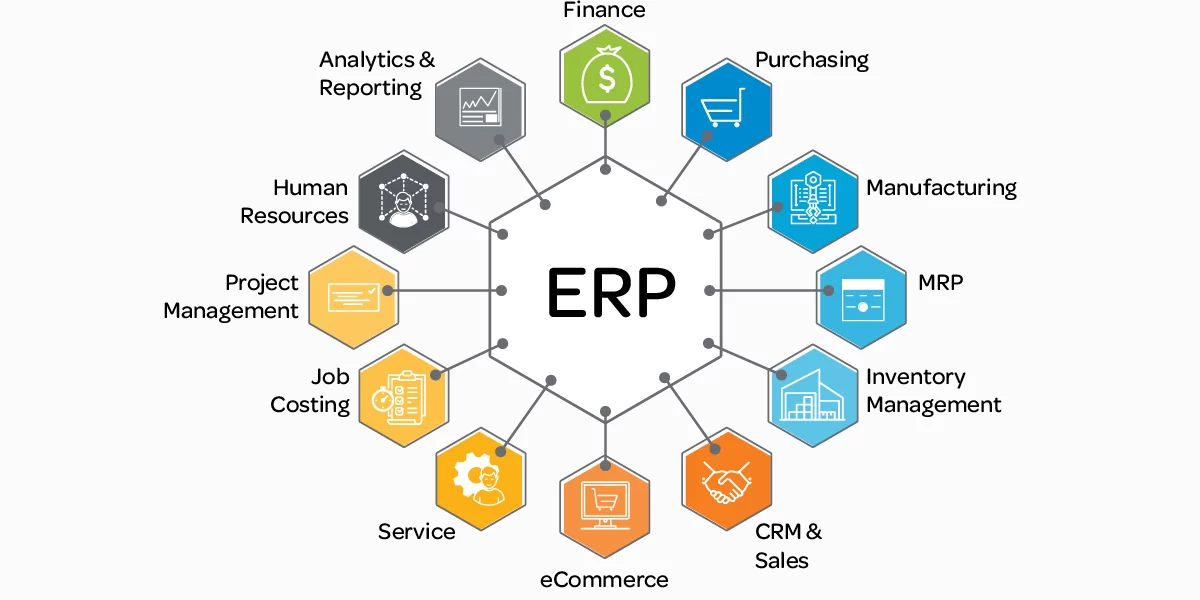In the dynamic and tech-savvy landscape of modern business, the effective handling of resources and data stands as a crucial pillar for achieving success. Here’s where ERP software takes center stage. Enterprise Resource Planning (ERP) software serves as a robust solution, enabling organizations to optimize their business processes, efficiently allocate resources, and empower data-driven decision-making. This article will explore the essence of ERP software and shed light on its wide-ranging advantages for enterprises spanning diverse industries.

Read more.. What is APY? : A Guide to the Atal Pension Yojana
Read more.. Which Credit Score is Ideal for Securing a Loan?
What is ERP Software?
ERP software, which stands for Enterprise Resource Planning software, encompasses a robust collection of interconnected applications meticulously crafted to streamline an organization’s fundamental operations, encompassing finance, human resources, supply chain management, manufacturing, inventory control, customer relationship management (CRM), and an array of other critical functions.

Read more.. Car Insurance Rates Surging, Here Are 8 Ways to Cut the Cost
Read more.. YES Bank Shares in Focus: JC Flowers ARC & Chief Risk News
Key Features of ERP Software:
1. Integration: ERP software integrates data and processes across various departments, eliminating the need for disparate systems. This integration enhances data accuracy and enables real-time data sharing.
2. Centralized Database: ERP systems maintain a centralized database that serves as a single source of truth for the entire organization. This ensures that all departments access consistent and up-to-date information.
3. Automation: ERP software automates repetitive and manual tasks, reducing the risk of errors and improving efficiency. This includes tasks like order processing, invoicing, and inventory management.
4. Reporting and Analytics: ERP systems offer robust reporting and analytics tools that allow organizations to make data-driven decisions. Users can generate customized reports and gain insights into key performance metrics.
5. Scalability: ERP software can scale as an organization grows. Whether a small business or a large enterprise, ERP systems can adapt to changing needs.
Benefits of ERP Software:
1. Improved Efficiency: ERP software streamlines business processes, reduces manual work, and minimizes duplication of effort, leading to improved overall efficiency.
2. Enhanced Visibility: With real-time data access and reporting, ERP systems provide a clear view of the organization’s operations, helping management make informed decisions.
3. Cost Reduction: By automating processes and optimizing resource allocation, ERP software can lead to cost savings in areas such as inventory management and procurement.
4. Better Customer Service: ERP systems often include CRM modules, allowing organizations to manage customer relationships more effectively, resulting in improved customer service.
5. Compliance and Security: ERP software helps organizations adhere to industry regulations and security standards by enforcing access controls and audit trails.
Conclusion
In the current cutthroat business landscape, upholding top-notch organization, efficiency, and data-driven intelligence is absolutely essential for attaining triumph. ERP software stands out as a critical instrument in achieving these goals, streamlining operations, enhancing transparency, and enabling well-informed choices. Irrespective of your organization’s scale, embracing and adeptly implementing ERP software can serve as a savvy move to propel your enterprise ahead during this epoch of digital transformation.





